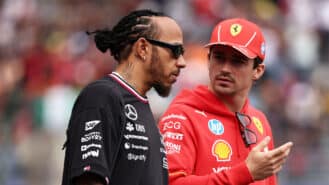
Verstappen proves Russell right: Abu Dhabi GP 2024 – Up/Down
Verstappen's prang at the first corner of the F1 finale in Abu Dhabi vindicated George Russell's recent rant
One of the more popular assumptions among the car buying public is that there is no longer any such thing as a bad car.
People tell me this with some regularity and you can even find journalists who’ll say the same, presumably because it excuses the fact that they’re never critical of anything they drive.
The interesting point is not so much that they’re all wrong – which they most assuredly are – but that this notion is no more correct now than it was decades ago when it was first peddled. Apparently my grandfather was fond of the maxim in the 1950s, speaking as he did from the perspective of someone who grew up around cars with only a slightly better than average chance of getting from one place to the next without breaking down.
And they’re still out there today. Of course you can get into any mass produced motor today and expect it to be reliable, reasonably comfortable and quiet. It will protect you far better in a crash than ever before having first reduced the chance of that crash happening in the first place. It will likely be far kinder to your wallet than any of its predecessors in terms of running costs and kinder to the environment too. But none of this makes a car good.
What makes a car good is that it does the job it was designed to do better than similar cars available for similar money. If follows that for every one of these cars that is better than the class average, so too must one be worse.

Of course not all cars are born bad. Some become bad over time by allowing themselves to be overtaken by events. I drove a Volvo XC90 the other day which was the class of its field when new. But that was a decade ago and the world has moved on and out of its sight in the interim. But others never were any good: the Peugeot 207 was a poor car when it came out and so it remains today.
And don’t think you can buy your way out of the bad car trap: bad cars exist at all points of the price spectrum and always have. The Aston Martin Virage Volante remains one of the three worst cars I’ve ever driven.

But there are degrees of being bad and I believe the era of the truly bad car is coming to an end. Twenty years ago you could build a rubbish car and still expect it to sell because its owners were not just less informed compared to today’s prospects, they were scarcely informed at all. Whether you were buying a Ford Sierra or a Ferrari 348 (rubbish cars both) if you did not happen to chance across a specific magazine carrying a specific review, the only information available came from the bloke trying to sell you the thing.
These days, and from the comfort of your sitting room, you can at the press of a mouse read more independent comment on any new car that might interest you than you could possibly use. Which, very broadly speaking, is why car manufacturers who have consistently maintained product standards are doing well, and those who’ve spent proportionally more of their budget on marketing than engineering are doing less well.
But even today the odd truly poor car slips through the net and finds its way onto the market. If anyone tells you there’s no such thing as a bad car any more, advise him or her to take a test drive in the new VW Beetle. If that doesn’t change their mind, nothing will.

Verstappen's prang at the first corner of the F1 finale in Abu Dhabi vindicated George Russell's recent rant

FIA president Mohammed Ben Sulayem seemed intent on making F1 a united front by the end of the 2024 Qatar GP – against him

Leclerc erupted after feeling wronged one time too many by Sainz in Vegas – but the challenge posed by his team-mate next year, Lewis Hamilton, will be much greater writes James Elson

2024 has been Max Verstappen's masterclass – it should go down in history as one of F1's greatest titles